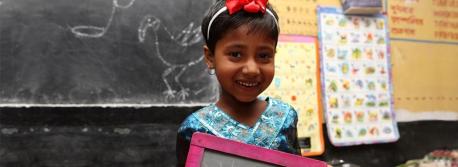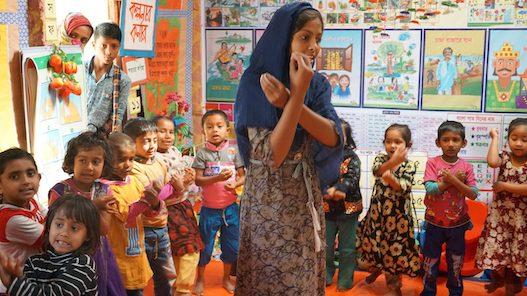
LET US LEARN BANGLADESH: PERSONALIZED LEARNING PATHWAYS
The Let Us Learn program in Bangladesh focuses on equity. UNICEF works to overcome barriers to formal education such as gender and poverty, providing resources for out-of-school children and learners with disabilities and cash stipends for families to cover the cost of formal schooling.
Some 100,000 children have benefitted from Let Us Learn Bangladesh since the program began in 2011.
The situation for children and education in Bangladesh
Bangladesh has the highest rate of child marriage in Asia and the fourth highest in the world. Married children are much more likely to drop out of school than their unmarried peers. Children who lack education often encounter difficulties finding suitable employment and developing a sustainable source of income as adults.
Access to formal education is difficult especially for children who live far away from any school. Heavy rains during monsoon season can damage schools and otherwise disrupt education — putting children at risk of dropping out of school permanently.
Responding to national COVID-19 lockdowns, the Bangladesh government rolled out remote learning packages on digital platforms, radio and TV but many students did not engage. Only 10 to 15 percent of children living in rural areas, for example, participated in TV classes. Families already burdened with the pressures of the pandemic struggled to find time to home school their children or were otherwise ill equipped to assume the role of teacher. For some, education was deprioritized over generating income to fund basic needs.
Providing quality education — tailored to learners’ needs
Through Let Us Learn Bangladesh, UNICEF helps learners get back to learning and catch up on their education through:
Pre-primary education: instruction for children ages 4 to 6 provided at UNICEF-supported community-based pre-primary education centers set up in remote villages where formal schools are few and far between. After one year students receive help transitioning to first grade
Ability-based Accelerated Learning: catch-up classes tailored to individual student needs provided to students ages 8 to 14 at learning centers with flexible hours to accomodate those who may have to work
Alternative Learning Pathway: vocational training and classroom seminars for youth ages 14 to 18 linked to apprenticeships with local businesses
The vocational training program has been especially beneficial for helping girls avoid early marriage, exercise more independence and break gender-barriers in social spaces. More than 80 percent of graduates are hired full-time by the business that trained them. Other graduates receive job placement assistance from a local government agency.

Let Us Learn Bangladesh staffer leads children in a song and dance at a pre-primary education center. ©UNICEF Innocenti/Chavez
Avoiding disruptions during monsoon season and emergencies
Let Us Learn works with communities to keep children learning through emergencies by creating a safe space to gather, water and sanitation facilities and other support. This is especially helpful during monsoon season.
During the COVID-19 pandemic, UNICEF leveraged the Let Us Learn program to increase communication and information sharing with communities and to reach children with earning materials. A survey of Let Us Learn beneficiaries showed a high rate of mobile phone access — 95 percent — which they further leveraged to reach beneficiaries with psychosocial support and education support.
For UNICEF Let Us Learn staff, the learning centers UNICEF has helped set up and run fill a critical gap for children in need. As one staff member describes it, they are "the only opportunity for these children to be free, to think positive, to dream, to interact with their peers... Perhaps this is more important than the question of learning."